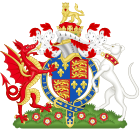Benefit of Clergy Act 1496 facts for kids
| Act of Parliament | |

|
|
| Long title | An Act to make some Offences Petty Treason. |
|---|---|
| Citation | 12 Hen. 7. c.7 |
| Territorial extent | |
| Other legislation | |
| Relates to | 23 Hen. 8. c. 1 (1531) |
| Text of statute as originally enacted | |
The Benefit of Clergy Act 1496 was an important law passed in England during the time of Henry VII of England. This law, also known as the Act 12 Hen. 7 c. 7, was created by the Parliament of England. Its main goal was to change how certain very serious crimes were handled, especially those known as "petty treason."
This Act made a big change by stopping something called "benefit of clergy" for these serious crimes. Before this law, people who could prove they were part of the clergy (church officials) or could read Latin might get a lighter punishment. This Act meant that even if someone could claim "benefit of clergy," they would still face the full punishment for petty treason.
Contents
Understanding the Benefit of Clergy
What Was It?
The "benefit of clergy" was a special rule in medieval English law. It meant that if someone committed a crime and could show they were a clergyman, they could be tried in a church court instead of a regular court. Church courts were often much less harsh than royal courts.
How Did It Work?
To claim this benefit, a person usually had to prove they were a cleric. Sometimes, simply being able to read a specific passage from the Bible (often called the "neck verse") was enough. This was because in those days, most ordinary people couldn't read, but clergy members could.
Why Was It Important?
This benefit gave clergy members a kind of legal protection. It meant they might avoid harsh punishments, like being put to death, even for serious crimes. Over time, more people tried to use this benefit, even if they weren't true clergy, just by showing they could read.
What Was Petty Treason?
A Serious Betrayal
"Petty treason" was a very serious crime in medieval England. It was about betraying someone you owed loyalty to, but not the king. Think of it as a betrayal within a household or a close relationship.
Examples of Petty Treason
Some examples of petty treason included:
- A servant harming their master or mistress.
- A wife harming her husband.
- A clergyman harming his bishop.
These acts were seen as breaking a very strong bond of trust and loyalty. They were considered less severe than "high treason" (which was betraying the king), but still very grave.
Why the Act Was Passed
Making Justice Fairer
The Benefit of Clergy Act 1496 was passed to make the legal system more fair. Before this Act, someone who committed petty treason might escape a severe punishment if they could claim "benefit of clergy." This meant that a very serious betrayal might not be punished as strictly as it should have been.
Ending Special Treatment
King Henry VII and his Parliament wanted to make sure that people who committed these serious acts of betrayal faced proper justice. By removing the "benefit of clergy" for petty treason, the Act ensured that everyone, regardless of their connection to the church or their ability to read, would be held fully accountable for such crimes. This helped to strengthen the king's laws and make them apply more equally to everyone.
See also
- High treason in the United Kingdom

